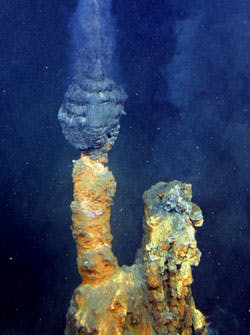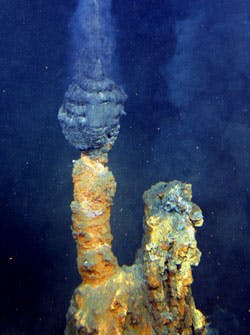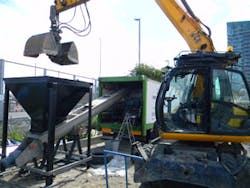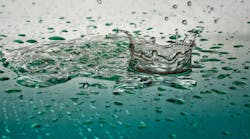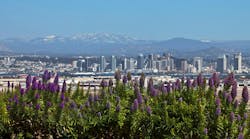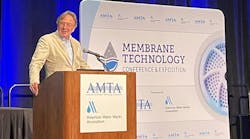A small UK based biotech company has developed an in-vessel composter that harnesses the unique abilities of extremophiles found near deep ocean vents, which it claims can reduce sludge volumes by up to 95%. We find out more about the Advetec story.
By Ben Messenger
While species such as Streptococcus, Staphylococcus and E. coli may have earned bacteria a fearsome reputation, since the dawn of time a great many more of their kind have been quietly doing our bidding. From the 100 trillion microorganisms in your digestive system, to their cousins that are used to make yoghurt - the number of bacteria which benefit the human race is huge.
For the most part the reason these bacteria are of use is because they can eat the things which we can't, or which are harmful to us, and excrete substances which we find nutritious or otherwise valuable. But with millions of species out there, finding the right one for the task at hand is important.
For example, the lactic acid bacterial species found in your probiotic yogurt will not dissolve steel. The halomonas titanicae species found eating the hull of the Titanic, nearly 4 km under the ocean, seemingly can.
Fussy eaters
Bacteria have been used for many years to treat the organic wastes in sewage. But optimising the process is not merely a case of picking the right little critters and setting them loose in a tank of festering sludge. Like people, bacteria can be fickle - and they need treating right.
Different types of bacteria thrive on different nutrients. In the treatment of sewage it's important to have the correct blend of organisms to eat the variety of waste materials present. But to keep them happy and help optimise their consumption of wastes, the industry has seen an increasing use of ‘biostimulants' that increase in the digestion rate of the organic material. And that's an area in which Bath, UK based Advetec has been carving itself a niche over recent years.
"We've developed different strains of product that feed different types of bacteria in different liquid effluents," Craig Shaw, the company's founder and managing director tells WWi. "For want of a better word: they're the five fruit and vegetables per day which microbes and microscopic organisms require to get them to eat waste in liquids."
In developing its biostimulants the company has worked with a number of utilities, including Thames Water and United Utilities. It has also been working with big food companies such as Kraft and Cadbury's, as well as waste management firms like Biffa and SITA for leachates.
However, with a growing understanding of the microbes used in both Anaerobic Digestion (AD) and composting, six or seven years ago the company changed tack following a project it had undertaken with a customer. And that's where things really get interesting.
"One of our clients had bought this machine but it wouldn't get rid of all the different types of food waste that they were throwing in - a very varied mix with lots of grease, fats, oils vegetable material, meats, everything," explains Shaw.
"Because of our understanding of microbial activity and what gets microbes to work much faster, we looked at this machine and we said really, if it had half the material in it the machine would work fine. But because you're putting all these different things in it's causing a bit of a caustic cocktail for the bacteria. They're not flourishing and they never will do the way that it's designed," he continues.
They came from the deep
The company did a lot of development on its client's in-vessel composting machine and quickly realised that thermophilic bacteria - composting bacteria - wouldn't do. According to Shaw, while these bacteria do work, the process is slow, and if you're producing hundreds of tonnes of waste you need something fast.
"We asked what type of bacteria would eat all of this organic waste and clean up the in-organic waste, all in one machine," he explains. "Well, there's a thing out there called extremophiles - bacteria that live in temperatures way above 100°C all the way up to 1000°C.
"We harvested our extremophiles several years ago," he adds. "Our background is that we're a deep sea exploration company, so we got the extremophiles from underwater volcanos."
The company used these organisms from the deep and applied them to the concept of in-vessel composting.
"What we did is create an in-vessel composter on steroids, with a starting temperature of about 140°C to 150°C and a finishing temperature of anything up to 300°C to 325°C. We were then able to take large quantities of organic material and very rapidly reduce it down to its minimum consistency. That's what the Bio Thermic Digester (BTD) is," explains Shaw.
Extreme digestion
Because they are not naturally occurring in the surface environment, Advetec's proprietary extremophiles have to be injected into the digester. And once there, they need maintaining. According to Shaw, the key to the BTD is keeping the bacteria in peak performance.
"We know exactly how to feed them so that they eat through things as fast as possible," he says. "You might like apples and I might like bananas. The situation is that different types of bacteria have different favourite foods. When you have an organic waste material first of all you have to find out which of the extremophiles like to eat it. Then you've got to think about what you put with them to have a healthy diet so that they're like an athlete rather than a couch potato.
"What the machine does is it takes out all the organics and it reduces the moisture down to less than 8%. There's nothing to put into landfill because the organics that would go to landfill have gone," continues Shaw.
Following a number of trials around the world, the company says that the technology is now ready for commercial deployment. The system is modular, with the biggest machine able to process 50 tonnes per day. Unlike composting, it's a constant feed process.
"Once you've got the machine running it's extremely efficient because one of the beauties of extremophiles is that a lot of the organic material is turned into water, but it's also turned into heat. We utilise that heat in a heat recirculation system in the machine, which means that once we've got it up to temperature we have minimal electrical costs," adds Shaw.
The only outputs are said to be distilled water, heat, a waste derived fuel and a small amount of digestate that even the extremophiles can't eat. This is the "burnt toast" that the organisms have merely "nibbled at".
"It's the hardest part of the carbon within the food chain," explains Shaw. "It's a really dark brown material that looks like coffee grinds. It's organic in nature but only 3% to 5% of what went in. The digestate produced by AD is typically 70% of what went in."
Off to market
The ability to recover clean water from organic effluents and wastewater has been an important asset as the company has moved towards commercialisation.
"We've just done two big installations at food factories in the Middle East and their primary concern is getting the water back for process as they use a lot of water for cleaning," says Shaw.
"By recuperating the water alone the machine will pay for itself in about 18 months, without counting the savings in disposal costs for the organic material itself."
But it's not just in the Middle East where the company is finding interest in the water recovery capabilities of its BTD technology. According to the managing director, because of the volumes of process water being consumed, it's a major issue in other countries too, and the output water from the process has been approved to be reused for certain purposes both in the UK and the US.
However, when it comes to cleaning water recovered from the processing of organic waste, Shaw explains that while it can be done there is a financial implication.
"You have to have a big driver," he says. "We're working with BAE Systems and a company called Dytechna in Wales for military specified for warships and for battlefront logistics, where recovering water for reuse is critical. In the military applications we're looking at cleaning it so that it's drinkable."
American snowball
The company first entered the US market around three years ago, and two years ago it installed three pilot plants that it moved around the country to three or four different wastewater treatment companies.
Because of the volume reduction achieved, the company found an eager market for processing sewage sludge. According to Shaw, while in many cases sewage sludge does have good fertiliser value, globally there are now pharmaceuticals making their way through the wastewater and into the residue cake.
"You've also got the issue of heavy metals concentrations rising in certain population centres, which means the sludge from large utilities has to go to landfill because it's contaminated with heavy metals and can't be used as a fertiliser," he says.
In those instances Advetec says that it is putting bio thermic digesters in to process the organic material and reduce the volume by 90% to 95% - and cutting the disposal cost accordingly.
"What happened was that the DEP issued the first ever permit for a machine to digest and remove organic waste," explains Shaw. "We put one on trial with the DEP for nine months and they tested the emissions, what went in, what came out – you name it they did it… and that's led to lots more enquiries and projects going ahead.
"Our first big client is a company called Peach Tree in Atlanta, Georgia. They've just signed a 10 year deal for machines to treat wastewater treatment sludge. The US market is probably the biggest growth area for us, and it really took off last September - it's snowballing over there," he says.
The Future
The company currently has 17 BTDs in service, but Shaw says that interest is rapidly growing, with a further 47 machines on order for delivery over the next two years.
"Our first really big orders started coming in from the US in August last year, and then the Middle East by October last year. From there it took off."
And with its ability to reduce organic waste volumes so significantly, while leaving behind a dry waste derived fuel, there has also been considerable interest from the waste management industry.
It may be early days for Advetec's BTD technology, but with the help of their superheros from the deep, it seems to have got off to an extremely good start.
Ben Messenger is managing editor of Waste Management World magazine – a bi-monthly title focusing on the global solid waste sector and in the same group as WWi. For more information, email: [email protected].
